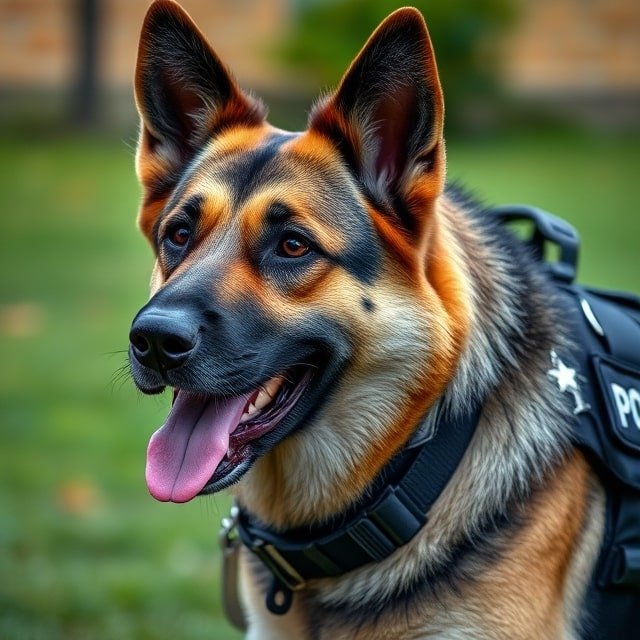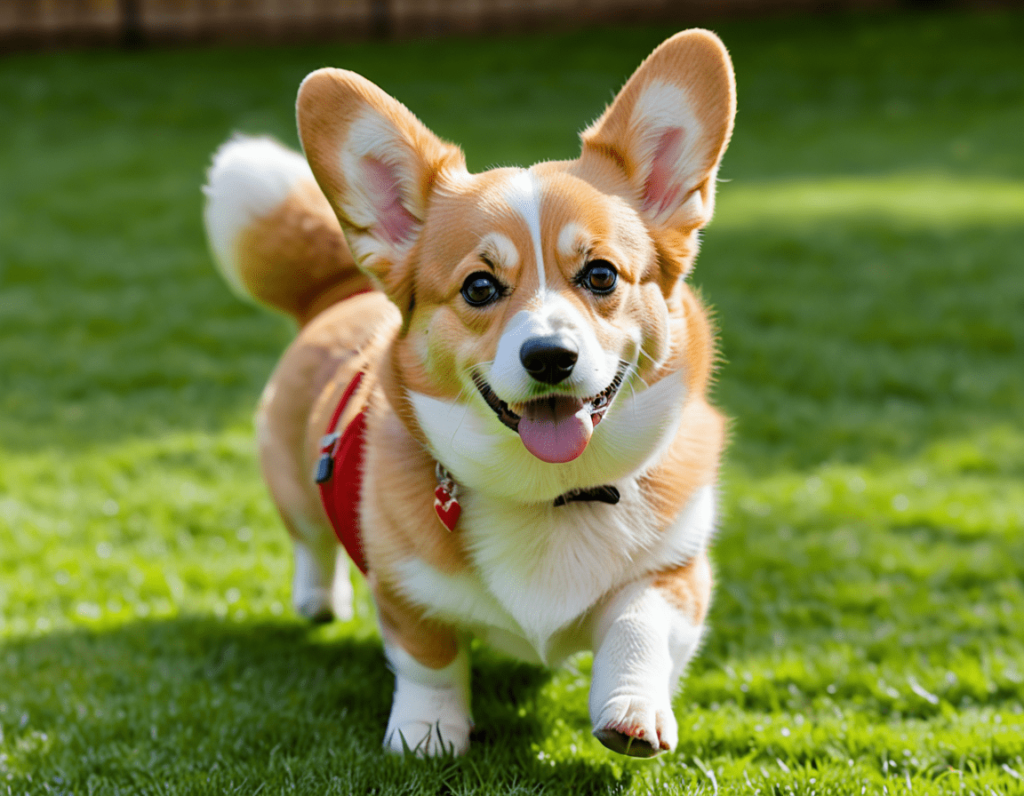
Dogs aren’t just loyal companions and cute Instagram stars; they’re also some of the hardest-working heroes on the planet! Military and police dogs are trained to handle some of the toughest, most high-stakes jobs out there. Think bomb detection, drug sniffing, search and rescue – the list goes on. They’re like the secret agents of the animal world, only they’re more likely to wag their tails than wear tuxedos!
Let’s dive into the world of military and police dogs to see how these canines contribute to public safety and national security. Spoiler alert: They’re not just “good boys” and “good girls” – they’re also very good at their jobs.
A Day in the Life of a Police Dog
Police dogs, often known as K9s (a cool play on the word “canine”), help law enforcement in numerous ways. These aren’t your average family pets; police dogs are rigorously trained to follow commands, track scents, and, if necessary, apprehend suspects. From sniffing out illegal substances to searching for missing persons, these dogs have their paws full.
What Do Police Dogs Do?
- Detection Work: Some dogs have noses that can detect drugs, explosives, and even firearms! These pups are often deployed at airports, borders, and large events to keep everyone safe.
- Tracking Down Suspects: With their strong sense of smell, police dogs can track a person’s scent over long distances and tough terrain. If you’re trying to hide from the law, don’t count on outrunning a K9!
- Search and Rescue: Police dogs are also trained to find people in all kinds of environments, from collapsed buildings to thick forests. When someone’s life is on the line, these furry detectives are there to help.
And yes, they often have their own little “badges,” making them official members of the team. If only they could also wear the uniform—now that would be a sight!
Military Dogs: The Four-Legged Soldiers
Military dogs, or MWDs (military working dogs), are specially trained to support soldiers in combat zones. These dogs are not just pets; they’re warriors who’ve earned their place on the battlefield. Some dogs even go through airborne training and can be parachuted into dangerous zones alongside their handlers. Talk about “paws-on” experience!
What Do Military Dogs Do?
- Explosive Detection: Military dogs are frequently used to detect explosives in combat zones. With their ultra-sensitive noses, they can sniff out danger long before humans can, saving lives by identifying hidden threats.
- Patrol and Protection: MWDs are often on patrol with their handlers, acting as an extra layer of security. They’re trained to alert soldiers to potential threats and defend their handlers in dangerous situations. Basically, they’re a one-dog security detail.
- Combat Tracking: Military dogs can also track individuals across rough terrain, which is essential for pursuing enemy forces. These dogs are like bloodhounds with a mission, tracking the scent even in extreme weather and hazardous conditions.
Fun fact: Military dogs even get rank! Usually, they hold a rank one step higher than their handler, a tradition intended to show respect. These dogs may not be interested in a promotion, but it’s a well-deserved honour for their bravery and dedication.

Training: From Pup to Pro
Becoming a police or military dog is no walk in the park. Training is tough, intense, and takes months to complete. Trainers assess dogs based on intelligence, drive, and temperament—not every pooch is cut out for the job. Breeds like German Shepherds, Belgian Malinois, and Labrador Retrievers are popular choices because of their intelligence, loyalty, and energy.
During training, these dogs learn everything from basic obedience to specialized skills:
- Obedience Training: Every working dog starts with basic obedience. They learn to respond to commands and stay focused, even with distractions around. No squirrels allowed!
- Agility Training: Police and military dogs need to be fast, strong, and nimble. Agility training prepares them to navigate obstacles and chase suspects if needed.
- Detection Training: For roles like drug and bomb detection, dogs go through scent detection training, learning to recognise specific scents and alert their handlers. It’s nose work at its finest!
At the end of training, these dogs are highly skilled professionals ready to serve. And yes, they get plenty of belly rubs and treats as part of their rewards for a job well done!
Famous Military and Police Dog Breeds
Not every dog breed is suited for high-stress work, but some are born for it. Here are a few of the most famous dog breeds used in military and police work:
- German Shepherd: The classic K9, German Shepherds are incredibly smart, loyal, and versatile. Whether it’s searching, tracking, or protecting, they’re up for the job.
- Belgian Malinois: Similar to the German Shepherd but a bit lighter and faster, Belgian Malinois are commonly used by military forces for their agility and sharp instincts.
- Labrador Retriever: While you might picture Labs as friendly family dogs, they’re also excellent detection dogs due to their incredible noses and friendly disposition.
- Bloodhound: Known for their remarkable tracking abilities, bloodhounds are often used for search and rescue missions. If a Bloodhound’s on your trail, good luck shaking it off!
Each breed brings unique skills to the table, making them perfect for different tasks in police and military settings.

Why Are Dogs So Effective in Military and Police Work?
Dogs have senses that are far beyond human capabilities. Here’s why they’re so effective in military and police work:
- Sense of Smell: A dog’s sense of smell is 40 times better than ours! This makes them excellent at detecting drugs, explosives, and even people.
- Loyalty and Courage: Dogs have a strong bond with their handlers, and their loyalty makes them willing to work in dangerous situations.
- Intelligence: Many working dogs come from breeds known for their high intelligence, making them quick learners and easy to train.
Fun Facts About Military and Police Dogs
- They Have Retirement Benefits: Many retired military and police dogs are adopted by their handlers or other families. Some even receive health benefits to help them enjoy a well-deserved retirement!
- They’re International Heroes: Police and military dogs are used around the world. Countries like the United States, Germany, and Russia have extensive training programs for these canine heroes.
- They Can Have Medals: Dogs who have shown extraordinary bravery in the line of duty can be awarded medals. For example, there’s the Dickin Medal, which is like the “Victoria Cross” for animals.
Conclusion: The Heroes We Don’t Deserve
Whether they’re sniffing out explosives or tracking down suspects, military and police dogs are incredible, highly trained animals who do it all out of loyalty and love for their handlers. These four-legged heroes put their lives on the line every day to protect us, and their contributions are nothing short of legendary.
So, the next time you see a police or military dog, remember that they’re not just cute faces. They’re highly skilled, hard-working heroes who deserve all the respect (and treats) we can give them. After all, not all superheroes wear capes… some just have wagging tails!
The Retirement Life of a K9: From Duty to “Dozing”
After years of dedicated service, police and military dogs do eventually get to retire. But retirement for these dogs often means a whole new chapter of love and comfort. Many retired K9s are adopted by their handlers, giving them a chance to enjoy a peaceful life with someone they know and trust. Some even receive ongoing veterinary care to ensure they stay healthy and comfortable in their golden years.
There’s also a growing number of organisations and communities dedicated to supporting retired K9s. These programs help cover costs and find homes for K9 heroes so they can enjoy their retirement with dignity. And for a dog that’s spent years protecting others, it’s the least we can do!

Why We Love and Respect These Four-Legged Heroes
Military and police dogs represent the pinnacle of loyalty, courage, and dedication. They don’t just perform their jobs—they do it with heart, connecting with their handlers and providing unwavering support. Every police officer and soldier who’s worked with a K9 partner can attest to the special bond these animals bring to their work.
So next time you see a K9 in action, give them a mental salute. They might not wear badges on their collars or recognise their medals, but they sure do make the world a safer place for us all. And while they might never fully understand just how valued they are, we know they’re priceless.
Final Thought: To the Dogs Who Make a Difference
From sniffing out danger to saving lives, military and police dogs prove that bravery comes in all forms. These dogs are heroes without ego, always ready to go where we need them most, guided by loyalty and a few ear scratches as thanks. They’re proof that sometimes the most effective protectors have wagging tails and love a good game of fetch when the day’s work is done.
Here’s to the dogs who work tirelessly so that we can sleep soundly. And to their handlers, too—thank you for sharing these incredible animals with the world.
The Role of Dogs in Military and Police Work—FAQs
1. What is the main purpose of dogs in military and police work?
Answer: Dogs in military and police work perform critical roles like detecting explosives, tracking suspects, searching for missing people, and protecting their handlers. With their powerful sense of smell and loyalty, they help keep soldiers, officers, and civilians safe.
2. What breeds are most commonly used in military and police work?
Answer: Common breeds include German Shepherds, Belgian Malinois, Labrador Retrievers, and Bloodhounds. These breeds are known for their intelligence, strength, and trainability, making them perfect for high-stakes tasks.
3. How are military and police dogs trained?
Answer: Training for these dogs is rigorous and often starts with basic obedience before moving on to specialised skills. They’re trained in scent detection, agility, and protection, preparing them to handle specific roles like bomb detection, tracking, and patrolling. Training can take anywhere from a few months to over a year, depending on their role.
4. Do military and police dogs get medals or awards?
Answer: Yes! Some dogs receive medals and awards for bravery and exceptional service. For instance, the Dickin Medal, often called the “Victoria Cross for animals,” honours dogs who show extraordinary courage. These furry heroes definitely earn their accolades!
5. Can you pet a military or police dog?
Answer: It’s generally best not to pet a working dog while they’re on duty, as it can distract them from their job. Always ask the handler first, and if they say no, don’t take it personally. These dogs are “on the clock” and need to stay focused.

6. Are military and police dogs considered official members of the force?
Answer: Yes! In fact, many K9 units consider these dogs as officers or soldiers. Military dogs often have a rank one step above their handler, showing respect for their service. They’re treated as part of the team, not just as animals, and are deeply valued by their human partners.
7. Do police and military dogs get to retire?
Answer: Absolutely. When a working dog reaches retirement age, they often live out their days in a comfortable home, usually with their handler. Some receive ongoing health benefits to support them in their golden years, and they are honored as retired heroes.
8. What’s the difference between military dogs and police dogs?
Answer: Military dogs are trained specifically for combat environments and often serve in roles like explosive detection and combat tracking. Police dogs, on the other hand, perform duties in public settings and may focus more on tasks like drug detection, suspect apprehension, and search and rescue.
9. Do military and police dogs wear protective gear?
Answer: Yes! Some dogs wear vests to protect them in dangerous situations, especially military dogs working in combat zones. These vests are often equipped with ballistic protection and GPS, making sure the dogs are as safe as possible during their work.
10. Why are dogs used instead of other animals?
Answer: Dogs have a sense of smell 40 times stronger than humans, making them ideal for detection work. They’re also highly loyal, quick learners, and naturally protective, qualities that are hard to find in other animals. Plus, they form strong bonds with their handlers, making them reliable partners in challenging situations.
11. How long does a working dog’s career last?
Answer: A working dog’s career usually lasts around 8-10 years, depending on their health and the intensity of their duties. After that, they’re typically retired to a peaceful home, where they can enjoy a well-earned rest.
12. Can retired police and military dogs be adopted?
Answer: Yes, and many retired dogs are adopted by their handlers or special organizations. These dogs often make great companions in their later years, as they’ve been well-trained and enjoy a structured, caring environment.
13. What’s the most surprising skill a military or police dog can have?
Answer: Military and police dogs are trained in some pretty remarkable tasks, like detecting changes in human sweat to identify stress or fear. They can also detect specific scents associated with illnesses or even certain substances.
14. Do police and military dogs need to meet fitness requirements?
Answer: Yes, these dogs undergo regular fitness and health check-ups to ensure they’re fit for duty. Just like their human partners, they need to stay in top physical shape to perform their jobs effectively.
15. Why do dogs make such good partners in military and police work?
Answer: Dogs are naturally loyal, have incredible senses, and are easy to train. These traits make them ideal partners in high-pressure and complex situations. Their keen sense of smell, loyalty, and intelligence enable them to perform tasks that even high-tech equipment sometimes can’t match.
16. How do military and police dogs relax after a day’s work?
Answer: Even the hardest-working dogs need to unwind! After a long day, most working dogs get time with their handlers to relax, play, or just enjoy a nice meal. Handlers understand the importance of a little R&R, and they make sure these furry heroes get their fair share!



Выбирал плитку – в каждом магазине разные рекомендации. То “берите только импортную”, то “наша ничем не хуже”. Обнаружил базу с ресурсами, где реальные мастера сравнивают продукцию честно. Теперь хоть понимаю, что покупать
Сайт
Часто требуется установка хрумера на сервер https://www.olx.ua/d/uk/obyavlenie/progon-hrumerom-dr-50-po-ahrefs-uvelichu-reyting-domena-IDXnHrG.html, чтобы обеспечить максимальную производительность.